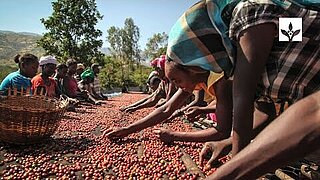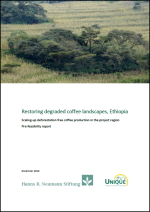Climate-friendly coffee for reforestation

In Ethiopia, the IKI is using a sustainable coffee project to support the reforestation of a biosphere reserve while simultaneously improving the financial situation of the local population.
The sun rises above the village of Hurumu in Ethiopia’s verdant green southwestern highlands, as Aster Fekadu and her family stand surrounded by coffee seedlings on their small farm in near Yayu, Oromia Region. This smallholding lies on the outer edge of a UNESCO biosphere reserve for the threatened Afromontane forest, whose core area encompasses 167,000 ha – an important carbon sink and also where the arabica species of coffee plant is thought to have originated.
Ethiopia is Africa’s biggest coffee producer. The total earnings from coffee grown by more than two million family-owned smallholdings make up roughly five percent of Ethiopia’s GDP. Coffee is more than just another agricultural product in Ethiopia.
Agriculture as a global driver of deforestation

Globally, agricultural land expansion is one of the main drivers of deforestation. Pressure on the remaining forested areas is also growing in southwestern Ethiopia. A key problem in this region stems from the smallholder families in the buffer zone to the Yayu biosphere reserve. As much as they have not fully exploited the potential of the land already under cultivation, they are expanding their plots into the core area – even though agricultural practices here is technically forbidden..
In the buffer zone, coffee trees grow naturally under tree shade that protect them from too much direct sunlight, or in partially forested systems (semi-forest) or close by residential buildings – a practice known as ‘garden coffee’ cultivation. Although originally planted by the smallholder families, these coffee lots are often barely tended. One of the reasons for this is the lack of access to knowledge and resources. Some of the coffee trees are also very old and their yields are poor. To increase yields, families often resort to planting more coffee plants – but then need to cut trees to create space for cultivation.
Mountaintop forests play a very important role in precipitation, which aids in replenishing groundwater and streams. Advance of smallholding operations and climate change threaten these forests. This results in a loss of biodiversity, water stocks and potential carbon sinks, and the destruction of the heterogeneous ecosystem in which coffee grows. The semi-forest coffee cultivation system offers a higher level of resilience than other systems or monocultures and therefore greater potential for countering the impacts of climate change – both economically and as a key contributor to biodiversity conservation and climate change mitigation. Conservation is a particularly important issue in this region, since it protects coffee’s genetic diversity, and therefore the basis for present and future coffee varieties.
Better methods for climate-friendly coffee

This is where the International Climate Initiative (IKI) project ‘Restoring degraded coffee landscapes’ is making its mark. The project is supporting smallholder families with better methods for climate-friendly coffee cultivation and processing. Armed with this agronomic expertise, they can improve their yields and living conditions without needing to clear more forest. With the right approach to managing existing stocks, yields can be at least doubled. Additional shade trees can also be planted as windbreaks or natural boundary markers: these not only aid the process of reforestation but also improve climate resilience for the coffee farms themselves.
Launched in 2018, the IKI project is co-financed by the Lavazza Foundation and the Hanns R. Neumann Foundation (HRNS) as project implementation partners in Ethiopia. A privately run foundation, the HRNS draws on more than 15 years of experience in agronomic projects in coffee regions, where it is active in the areas of youth, farmer cooperatives, climate change, family-run businesses and gender equality. To date, the project and its activities which also include training, have involved around 2,000 smallholder coffee producers, together with their families.
Aster Fekadu took part in a ‘Farmer Field School’ implemented by the IKI project, after encountering problems with her 1.6 ha garden coffee plantation: yields were poor from her dense stands of old, unmanaged coffee trees. The family was also experiencing climate change impacts in the form of unusual weather events or new kinds of diseases affecting their coffee plants. Unfortunately, asthe family was not a member of a farmer cooperative, this meant they had no access to advice, knowledge of cultivation methods, finance and other essential services for modern agricultural businesses, and so were unable to exploit the marketing potential of their coffee.
At first, Aster found it hard to adapt to the new methods. The practice of ‘stumping’, where trees are pruned to a short stump, gave her particular cause for concern. “I was supposed to stump my old coffee trees but I really did not want to do it. I would have nothing left to harvest.” Finally, she agreed to try the method out on a quarter of her trees, but only if the HRNS agreed to cover her losses in the event of the trees failing to produce new growth. Aster need not have worried, as she recounts, “My farm was once full of old coffee trees, for years, it was really just a piece of land with almost nothing to harvest. But my old and supposedly dying trees are bearing fruit once again. I am now a real fan of stumping and the other agricultural methods I have learned, such as diversification and the proper use of shade trees.” Aster’s family has also branched out into compost, which lets them produce their own fertiliser. The improved cultivation methods have had a visible impact on Aster’s farm, with the family more than doubling their coffee harvest.
IKI project to promote gender equality

Although Aster had her doubts at the begining, she is now the driving force behind her family’s economic success. Thanks to the project’s equal opportunities modules, the family realised that they could develop and implement a vision for the family-run farm together. As she shares, : “The project helped us learn how to treat one another with respect and understanding, and work together as a team.” Her husband Eshetu has been very supportive. In fact, he encouraged Aster to take responsibility for this reorientation of the family business, saying, “I am the proud husband to a wonderful and independent woman who knows how to get things done. We have managed to overcome our deeply rooted cultural traditions, and the idea that women and men should assume different roles in the family. I do everything that my wife does, including fetching water, collecting firewood and cooking.”
At Aster’s, the farm is a family business. The whole household chips in, including both her husband and her uncle Adissu. After coming home from school, her children Kassahun and Engabu also help out. The fact that they both now go to school is also thanks to the family’s improved income and their new financial security.
Improving revenues with farmer’s collectives

Improving yields is only a part of the solution when it comes to supporting smallholders. These families also need to become strong and active participants in the overall coffee value chain. To achieve this, the IKI project is working with nine regional farmer’s collectives and a coffee cooperative, providing support to these organisations for their coffee processing, storage and marketing. Aster’s family is now a member of the Lacosaya farmer’s collective. This means she is now part of a community with other farmer’s families, which lets her not only help shape economic structures but also involve young people and strengthen the role played by women.
Above all, this has improved her marketing options for the bigger harvests from her coffee farm. Her network also gives her access to other lines of business. “We now have a large vegetable garden at the back, where we are also growing maize,” says Aster. “What we don’t eat ourselves, we sell.” Overall, the family earned almost EUR 6,000 for the 2021/22 growing year. “We now enjoy a varied diet, can finance the education of our children and plough our earnings back into our own coffee production business,” she adds.
Tree nursery for reforestation
To avoid becoming too dependent on coffee while also helping reforestation efforts in the region, the family has also opened a tree nursery. “This is our contribution to local conservation and also another source of income,” says Aster. The project has funded a total of 63 tree nurseries for coffee plants and shade trees so far. The 225,000 coffee seedlings grown to date are helping to achieve the much-needed rejuvenation of coffee farms with new plants. Aster herself now has around 5,000 new coffee trees on her own lot. All of these form part of future tree stocks in the Yayu biosphere reserve, and are helping to reduce deforestation and degradation pressures.
This is also the future for the thousands of small seedlings Aster is surrounded by on this sunny morning, as they mature into large and lofty coffee trees, fruit trees and shade trees.
The link has been copied to the clipboard
Contact
IKI Office
Zukunft – Umwelt – Gesellschaft (ZUG) gGmbH
Stresemannstraße 69-71
10963 Berlin





